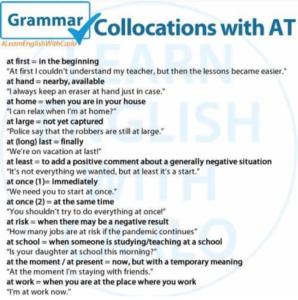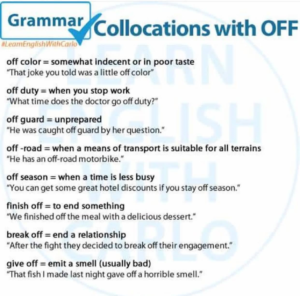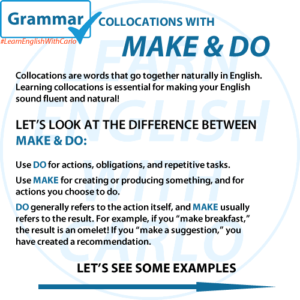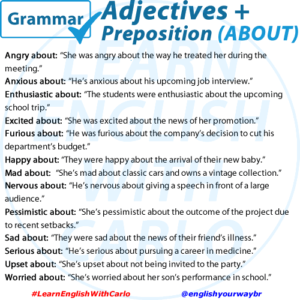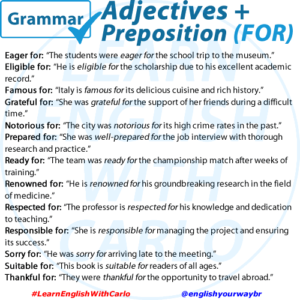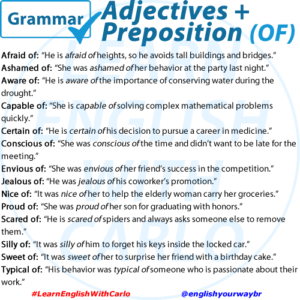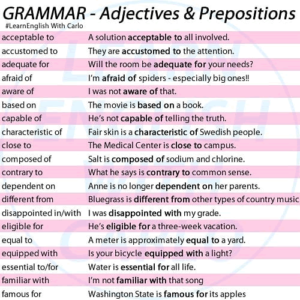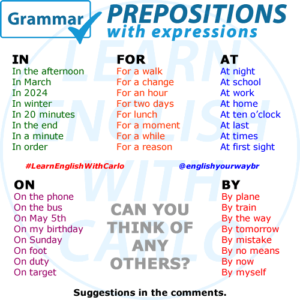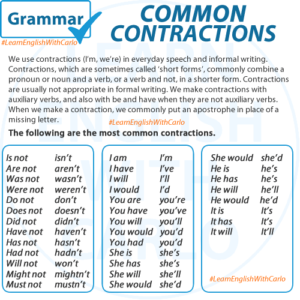The preposition “at” is used in many common expressions in English, each with unique meanings. Below, you’ll find clear explanations and examples to help you understand and use these expressions confidently. Let’s explore! 1. At First = In the beginning This expression describes the initial phase of something, often followed by a change. Examples: 2. …
Category: COLLOCATIONS
Permanent link to this article: https://englishyourway.com.br/grammar-collocations-with-at/
Apr 25
GRAMMAR – Collocations with off
The English preposition “off” has a variety of meanings and uses, often forming part of idiomatic expressions and collocations. In this blog post, we’ll explore some common expressions with “off,” provide clear definitions, and share examples for each. Let’s dive in! 1. Off Color Definition: Something that is somewhat indecent, inappropriate, or in poor taste.Examples: …
Permanent link to this article: https://englishyourway.com.br/grammar-collocations-with-off/
Mar 19
GRAMMAR – Collocations with MAKE & DO
Collocations are words that go together naturally in English.Learning collocations is essential for making your English sound fluent and natural! LET’S LOOK AT THE DIFFERENCE BETWEEN MAKE & DO:Use DO for actions, obligations, and repetitive tasks.Use MAKE for creating or producing something, and for actions you choose to do. DO generally refers to the action …
Permanent link to this article: https://englishyourway.com.br/grammar-collocations-with-make-do/
Feb 05
Adjectives + Prepositions (ABOUT)
Let’s continue our dive into the fascinating world of adjectives paired with prepositions! In English, certain adjectives are commonly followed by specific prepositions to express various relationships, attitudes, and qualities. Understanding these combinations can greatly enhance our language skills and enrich our expressions. Join me as we explore some examples of adjectives paired with prepositions …
Permanent link to this article: https://englishyourway.com.br/adjectives-prepositions-about/
Feb 04
Adjectives + Prepositions (FOR)
We are continuing our dive into the fascinating world of adjectives paired with prepositions! In English, certain adjectives are commonly followed by specific prepositions to express various relationships, attitudes, and qualities. Understanding these combinations can greatly enhance our language skills and enrich our expressions. Join me as we explore examples of adjectives paired with prepositions …
Permanent link to this article: https://englishyourway.com.br/adjectives-prepositions-for/
Feb 03
Adjectives + Prepositions (OF)
We are continuing our dive into the fascinating world of adjectives paired with prepositions! In English, certain adjectives are commonly followed by specific prepositions to express various relationships, attitudes, and qualities. Understanding these combinations can greatly enhance our language skills and enrich our expressions. Join me as we explore examples of adjectives paired with prepositions …
Permanent link to this article: https://englishyourway.com.br/adjectives-prepositions-of/
Jan 08
Collocations – Nouns + Prepositions
Certain nouns are often accompanied by specific prepositions, creating noun-preposition collocations. For instance, when we use the noun “interest,” it is typically followed by the preposition “in.” Similarly, “contact” pairs with “with,” and “room” with “for.” For example: Recognizing which preposition to use in these collocations can be challenging. One helpful strategy is to consider …
Permanent link to this article: https://englishyourway.com.br/collocations-nouns-prepositions/
Permanent link to this article: https://englishyourway.com.br/adjectives-with-prepositions/
Sep 06
GRAMMAR – PREPOSITIONAL PHRASES
Here are some common prepositional phrases, also known as Collocations with prepositions. Prepositional Phrases for Time: Prepositional Phrases for Location or Movement: Prepositional Phrases for Cause or Reason: Prepositional Phrases for State or Condition: Prepositional Phrases for Manner or Degree: PREPOSITIONS with expressions INIn the afternoonIn MarchIn 2024In winterIn 20 minutesIn the endIn a minuteIn …
Permanent link to this article: https://englishyourway.com.br/grammar-prepositional-phrases-2/
Jul 22
GRAMMAR – COMMON CONTRACTIONS
GRAMMAR – COMMON CONTRACTIONS We use contractions (I’m, we’re) in everyday speech and informal writing. Contractions, which are sometimes called ‘short forms’, commonly combine a pronoun or noun and a verb, or a verb and not, in a shorter form. Contractions are usually not appropriate in formal writing. We make contractions with auxiliary verbs, and …
Permanent link to this article: https://englishyourway.com.br/grammar-common-contractions/
- 1
- 2

